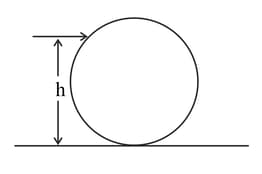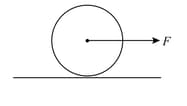Torque and Angular Momentum
Important Questions on Torque and Angular Momentum
A uniform sphere of mass and radius is placed on a rough horizontal surface Gigure). The sphere is struck horizontally at a height from the floor. Match the following:

| (a) | (i)Sphere rolls without slipping with a constant velocity and no loss of energy. |
| (b) | (ii) Sphere spins clockwise, loses energy byfriction. |
| (c) | (iii) Sphere spins anti-clockwise, loses energyby friction. |
| (d) | (iv) Sphere has only a translational motion,looses energy by friction.SA |
A uniform disc of radius , is resting on a table on its rim. The coefficient of friction between disc and table is (Figure).

Now the disc is pulled with a force as shown in the figure. What is the maximum value of for which the dise rolls without slipping?
Two cylindrical hollow drums of radii and , and of a common height , are rotating with angular velocities (anti-clockwise) and (clockwise), respectively. Their axes, fixed are parallel and in a horizontal plane separated by . They are now brought in contact .
Identify forces and torques external to the system just after contact.
Two discs of moments of inertia and about their respective axes (normal to
the disc and passing through the centre), and rotating with angular speed and are brought into contact face to face with their axes of rotation coincident.
Find the angular speed of the two-disc system.
Two discs of moments of inertia and about their respective axes (normal to
the disc and passing through the centre), and rotating with angular speed and are brought into contact face to face with their axes of rotation coincident.
Does the law of conservation of angular momentum apply to the situation? why?
A door is hinged at one end and is free to rotate about a vertical axis . Does its weight cause any torque about this axis? Give reason for your answer.
The vector sum of a system of non-collinear forces acting on a rigid body is given to be non-zero. If the vector sum of all the torques due to the system of forces about a certain point is found to be zero, does this mean that it is necessarily zero about any arbitrary point?
Figure shows a lamina in plane. Two axes and pass perpendicular to its plane. A force acts in the plane of lamina at point as shown. Which of the following are true? (The point is closer to than the .)
The net external torque on a system of particles about an axis is zero. Which of the following are compatible with it?
A Merry-go-round, made of a ring-like platform of radius and mass , is revolving with angular speed . A person of mass is standing on it. At one instant, the person jumps off the round, radially away from the centre of the round (as seen from the round). The speed of the round afterwards is


